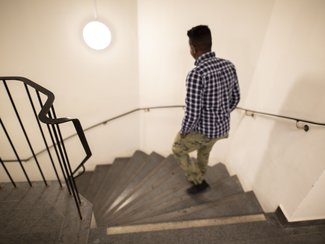
Samatar’s Story: The deadly road to Europe
Samatar is a young Somali who came to Sweden in 2016. He grew up in a region marked by poverty and civil war. Many of his school mates left the country in search of peace, opportunity and a better life. Some reached Europe and began sharing pictures, messages and posts about their good fortune in their new place of residence. Samatar wanted such a future himself, so he decided to go to Europe.
“They told me I should come to Europe. When they sent me pictures, I got jealous and decided to travel there. The images I saw of Sweden showed a beautiful place: this man standing in front of nice scenery, in a cap and sunglasses. I thought, Wow, this man owns that car and he has lots of money.
This place is full of money. I should go there and get some.”
It seemed to him that even the physical appearance of his friends had changed: they looked white-skinned in the pictures posted, and he wanted to look as they did. He and some of his classmates, teenagers all, decided to run away and travel to Europe. They left school one day at lunch time, without informing their parents, who would have stopped them. They gathered all their money, even stealing for the journey.
They travelled through Ethiopia by car and on foot; then they crossed the Sudanese border via forests and fields, avoiding guards. Their smugglers were harsh and brutal, beating those who walked too slowly and leaving behind those without the strength to continue. When they arrived in Khartoum, they were exhausted, their feet bruised and infected. Samatar and six others had contracted malaria in the bush.
After a tortuous journey through the Sahara, during which Samatar feared he would die from the heat, they arrived in Libya. They were taken to a compound, told to pay USD 4,800 within three days and provided phones to call and ask their families for money. This was a shock to the Somali teens who knew nothing about such things. To force their parents to pay, the smugglers beat them mercilessly.
“Many Somalis had their legs broken by the traffickers. A lot of people died from the beatings. During those two months, I was beaten with steel and my leg was injured.”
He and his friends collected only half the sum the smugglers demanded but were released and allowed to continue to the coast. The passage to Italy was equally terrifying; in the midst of a vast and pitiless ocean, the sadism and cruelty continued. One sick boy who asked for medicine was shot.
Arriving in Europe, Samatar expected to find the earthly paradise he had been promised. He looked for money scattered on the ground and fantasized about being adopted by a rich lady who would notice him while walking her dog in the park. These illusions quickly vanished, and he realized that even in Europe, there is no free ride and no easy money. He has paid a terrible price for this knowledge.
“I feel anxious and cannot sleep at night. I have nightmares of being beaten. To distract ourselves, my friends and I go out. If I am alone, I remember what happened in the camp: the people whose legs and arms were broken; a boy who was shot and killed; and other bad things. I am too traumatized to adapt to this society.”
